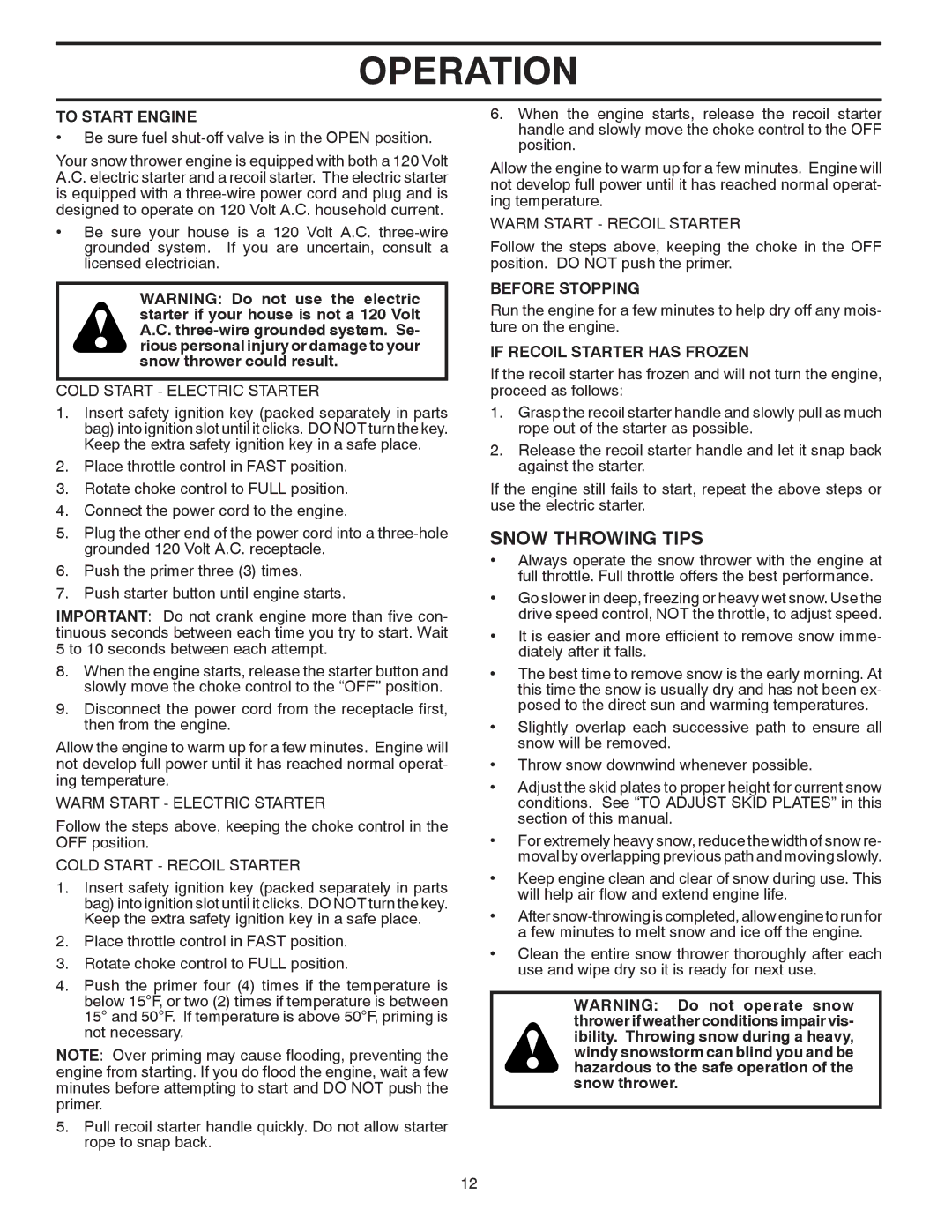
OPERATION
TO START ENGINE
•Be sure fuel shut-off valve is in the OPEN position.
Your snow thrower engine is equipped with both a 120 Volt A.C. electric starter and a recoil starter. The electric starter is equipped with a
•Be sure your house is a 120 Volt A.C.
WARNING: Do not use the electric starter if your house is not a 120 Volt A.C.
COLD START - ELECTRIC STARTER
1.Insert safety ignition key (packed separately in parts bag) into ignition slot until it clicks. DO NOT turn the key. Keep the extra safety ignition key in a safe place.
2.Place throttle control in FAST position.
3.Rotate choke control to FULL position.
4.Connect the power cord to the engine.
5.Plug the other end of the power cord into a
6.Push the primer three (3) times.
7.Push starter button until engine starts.
IMPORTANT: Do not crank engine more than five con- tinuous seconds between each time you try to start. Wait 5 to 10 seconds between each attempt.
8.When the engine starts, release the starter button and slowly move the choke control to the “OFF” position.
9.Disconnect the power cord from the receptacle first, then from the engine.
Allow the engine to warm up for a few minutes. Engine will not develop full power until it has reached normal operat- ing temperature.
WARM START - ELECTRIC STARTER
Follow the steps above, keeping the choke control in the OFF position.
COLD START - RECOIL STARTER
1.Insert safety ignition key (packed separately in parts bag) into ignition slot until it clicks. DO NOT turn the key. Keep the extra safety ignition key in a safe place.
2.Place throttle control in FAST position.
3.Rotate choke control to FULL position.
4.Push the primer four (4) times if the temperature is below 15°F, or two (2) times if temperature is between 15° and 50°F. If temperature is above 50°F, priming is not necessary.
NOTE: Over priming may cause flooding, preventing the engine from starting. If you do flood the engine, wait a few minutes before attempting to start and DO NOT push the primer.
5.Pull recoil starter handle quickly. Do not allow starter rope to snap back.
6.When the engine starts, release the recoil starter handle and slowly move the choke control to the OFF position.
Allow the engine to warm up for a few minutes. Engine will not develop full power until it has reached normal operat- ing temperature.
WARM START - RECOIL STARTER
Follow the steps above, keeping the choke in the OFF position. DO NOT push the primer.
BEFORE STOPPING
Run the engine for a few minutes to help dry off any mois- ture on the engine.
IF RECOIL STARTER HAS FROZEN
If the recoil starter has frozen and will not turn the engine, proceed as follows:
1.Grasp the recoil starter handle and slowly pull as much rope out of the starter as possible.
2.Release the recoil starter handle and let it snap back against the starter.
If the engine still fails to start, repeat the above steps or use the electric starter.
SNOW THROWING TIPS
•Always operate the snow thrower with the engine at full throttle. Full throttle offers the best performance.
•Go slower in deep, freezing or heavy wet snow. Use the drive speed control, NOT the throttle, to adjust speed.
•It is easier and more efficient to remove snow imme- diately after it falls.
•The best time to remove snow is the early morning. At this time the snow is usually dry and has not been ex- posed to the direct sun and warming temperatures.
•Slightly overlap each successive path to ensure all snow will be removed.
•Throw snow downwind whenever possible.
•Adjust the skid plates to proper height for current snow conditions. See “TO ADJUST SKID PLATES” in this section of this manual.
•For extremely heavy snow, reduce the width of snow re- moval by overlapping previous path and moving slowly.
•Keep engine clean and clear of snow during use. This will help air flow and extend engine life.
•After
•Clean the entire snow thrower thoroughly after each use and wipe dry so it is ready for next use.
WARNING: Do not operate snow thrower if weather conditionsimpair vis- ibility. Throwing snow during a heavy, windy snowstorm can blind you and be hazardous to the safe operation of the snow thrower.
12
